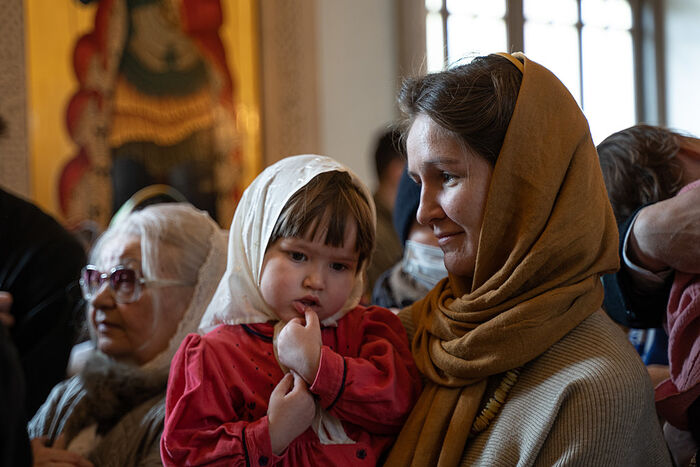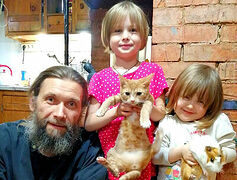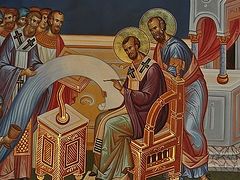A child should receive his first experience of prayer in the family, when he sees his parents pray for each other and for their close ones, believes Igor Tikhonovsky, a leading specialist at the Missionary Center of St. Tikhon’s Orthodox University of Humanities, director of the Sunday school of the Church of the Icon of the Savior Not Made by Hands in Perovo (Moscow), a father of five children. We have talked with Igor about the main principles of relations with children, continuing conversations about bringing up children in the right Christian way.
—Igor Vladimirovich, there are often cases when a child doesn’t find a friend in some close adult, in a teacher or a parent. And people whom it would be better not to contact at all often claim this role. How are we to detect this moment? How are we to protect our son or daughter from such a thing? Or should we just pray?
—We should always pray, because prayer is the basis of our connection with God. As I always say, God will be with us in our lives as long as we ask Him for this so that He will be in us. Yes, the world can offer anything. What do we organize all these walking tours, camps and trips for? Why do we have Sunday Schools? To have a meeting of like-minded people, friends who are united by faith in God. In the teenage years, this is always very important. It is vital for children to be friends with each other and share their religious experiences in the church.
— From whom should a child receive his experience of prayer?
—From his parents, of course. They have to do this. Parents and children should pray together. In every family all this is done in different ways; it is, of course, very individual. And from my experience, the experience of my family, I will say that I don’t force the little ones to strictly adhere to the prayer rule. They can lie down and listen.
—Do dad and mom always read the prayers?
—No, children must read too. Our family evening rule has some prayers that only children read. This is a developed system of prayer rules. And the children are very happy to do it. It works in our family, and it has become important for the children. Reading prayers is vital. Of course, even if the children refuse to pray, we will nevertheless pray ourselves, and they know it. We don’t force anyone. Whoever wants to lie down, or sit down, or stand up is absolutely free to do it if they feel more comfortable this way; but the children always participate in prayer.
— Does it mean that the ability to pray becomes the tool that will help him return to God if at some point he as a teenager walks away from the faith and leaves the Church?
—The child will be able to pray—that’s what is important. He will know the path to communion with God. Perhaps the child will not always or not immediately return to this path, but he will always know how he can do it.
—Should parents mold and correct the circle of their kid’s friends? Do they have the right to say to their children: “Don’t be friends with this one, be friends with that one because he’s good”?
—I still think that parents in general should always be attentive to who their child is friends with and what influence this friend has on him. This is necessary because it is a concern for the inner, moral development of your child; the moral and spiritual foundations of the child are formed this way.
I will say from my family’s experience. Our children study in a high school and are friends with some other students, but I don’t care for those friendships. As a believer I think that such friendship isn’t needed. But I don’t say to my child, “So, just try to talk to him and you’ll get it!...” No, of course not. With the older children I point out some things their friends do and explain why they contradict our family’s Orthodox Christian values. We talk, and I ask: “Do you think he did the right thing? You are friends, but you should know that this person is against what you hold dear.”
— Do the children heed their father’s words?
—Certainly not right away. I never give ready-made answers. I always invite the children to speculate. And when we start to think together, to analyze certain events, they themselves give the answer that I expect from them.
—What basic principles should a parent adhere to in dealing with a child?
 —First of all, trust. A parent is obliged to trust his child. Any form of rudeness or aggression on the parents’ part is repulsive. It often happens that a child has told or shared something with his parents, and they start scolding him for what he said or did wrong. And then can you hope that your child will tell you something else? Certainly not! He will remember that after sharing something he was told off or punished.
—First of all, trust. A parent is obliged to trust his child. Any form of rudeness or aggression on the parents’ part is repulsive. It often happens that a child has told or shared something with his parents, and they start scolding him for what he said or did wrong. And then can you hope that your child will tell you something else? Certainly not! He will remember that after sharing something he was told off or punished.
It is very important to be attentive to your child and see what is happening to him. I understand that modern parents are very busy and have little energy. But you need to try to pay attention to the child, for at least an hour a day. You may not like everything you hear from him, but you should you never scold him for it. Never! Listen to him, pray for him, advise something.
— Is it important for a child to feel how dear he is to his parents?
—It is very important for our children and us to be surrounded by like-minded people. And this environment is formed not only by the parents, but also by the parish, by friends in the church. It is very essential to try and preserve all this. The most important thing in all this is love. If there is love—from both parents and teachers—then love and prayer for our children will cover everything.






